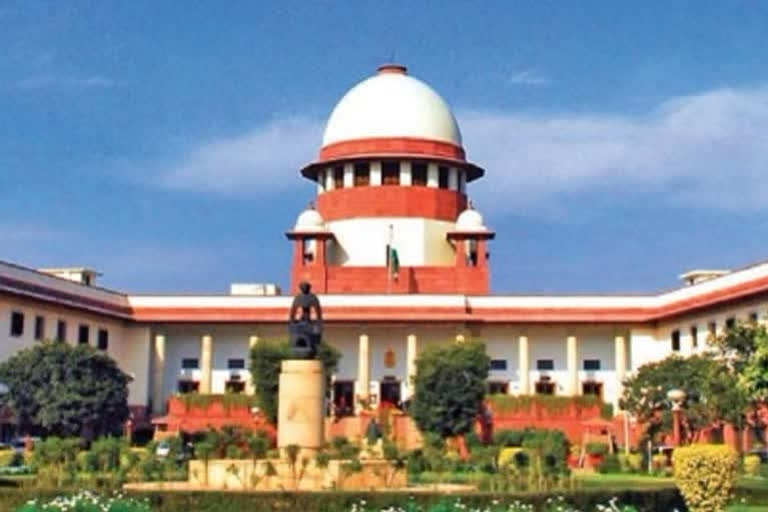New Delhi: A three-judge bench of the Supreme Court on Monday remarked, "You must smell the coffee", as it grilled the Central Government over its vaccine policy and emphasised that the policy to fight back the deadly virus should be aligned with the ground situation in the country.
A bench comprising Justices D.Y. Chandrachud, L. Nageswara Rao and S. Ravindra Bhat told Solicitor General Tushar Mehta, representing the Centre, "You must smell the coffee and see what is happening across the country", and stressed that Centre's vaccination policy should not be carved in stone, rather it should evolve based on the ground situation.
The bench suggested that the Centre must know the ground situation and change its policy accordingly.
"If we had to do it, we would have done it 15 to 20 days back. If we had to do, we would have done so 15 days ago. But we want you to smell the coffee and realise what is happening in the country and make the necessary amendments.", said the bench.
The bench emphasised that the vaccination not reaching the rural population and indicated that 75 per cent vaccination is being done in urban areas. "With shortage there is no chance of vaccine going in rural areas," the bench noted.
Procurement of Vaccines by Centre
Court observed that the government buys 50 percent of vaccines at its negotiated price, the remaining 25 percent is for the states and other 25 percent is for private, both of which have to procure at a much higher rate than the central government. It asked that when the government has the right to fix prices then why has it left the 50 percent of vaccines' pricing. It also expressed its confusion on vaccine tender issued by states, some being denied by manufacturers to deal with them.
Mehta told the court to not travel that path as it may appear that the court is hampering the government's negotiations. However, Court responded back to him, saying that "there is no such impression" and it just "wants to know the rationale behind the dual policy."
Apex court notes lesser vaccinations in rural India
Justice Chandrachud also noted that private hospitals, procuring the vaccines, are not serving the core rural areas, therefore the Centre is merely addressing urban areas. "The policy today does not include vaccination in rural areas, it is a matter of concern," noted the bench.
Justice Chandrachud emphasised the policy cannot be an ad-hoc day-to-day response, instead, there should a plan based on science. "We want the policy to be amended..need enforceable policies for the country. You have to have the policy to deal with these issues. If a new issue comes up then the policy has to address it", said the bench.
'We won't make policies for you': SC
Citing technical glitches on CoWIN application used for registration for vaccinations, Justice Bhat said he had received distress calls from all over the country, and added that young people, who had registered for vaccination, visit private hospitals, only to find all slots are booked.
Making it clear that its suggestion on vaccine policy should be taken in the right stride, the bench said "We are not going to run central govt and make policies for you."
On the aspect of vaccine policy, Justice Chandrachud told Mehta that the ability to recognise that 'I am wrong' is not a sign of weakness, but that of strength.
He added that this is a platform for dialogue across the spectrum. "The idea is not to criticise but to strengthen the arms of the government. The fact that MEA went abroad, had dialogue shows the seriousness of the situation", said Justice Chandrachud.
During the top court's suo motu hearing on Covid-19 crisis management in the country, the Centre informed the top court that it is confident of vaccinating all eligible persons over 18 years, by the year-end. Mehta submitted the production from domestic vaccine producers will be enough to vaccinate all who are over 18 years of age.
'Need to define the limits of Sedition'
The three-judge bench made a mention of 'defining the limits of sedition' while referring the indiscriminate use of sedition against the media.
The court also on the coverage of COVID related deaths and disposal of dead bodies had observation on how media was covering the ground reality. While hearing the cases of two Andhra Based channels on the Covid front, the judge quipped that he does not know whether sedition has been slapped on the channel that recently showed bodies being dumped in the river and said that this case of the two Telegu channels was in his mind when he made the comments when senior advocate Meenakshi Arora had made submissions for guidelines on dignified disposal of bodies of COVID patients. The court stayed the coercive action against the channels and asked for defining sedition and the laws regarding in proper context.
With agencies inputs



